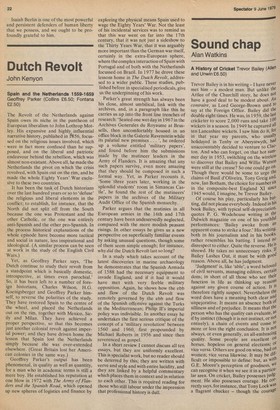Dutch Revolt
John Kenyon
Spain and the Netherlands 1559-1659 Geoffrey Parker (Collins £6.50; Fontana £2.50) The Revolt of the Netherlands against Spain owes its niche in the pantheon of European liberalism to John Lothrop Motley. His expansive and highly, influential narrative history, published in f656, focussed on the religious issues involved, which • were in fact more confused than he supposed, and on the liberal and patriotic endeavour behind the rebellion, which was almost non-existant. Above all, he made the Netherlands the pivot on which The crisis revolved, with Spain out on the rim, and he made the whole Eighty Years' War exclusive to these two countries.
It has been the task of Dutch historians over the last hundred years or so to 'defuse' the religious and liberal elements in the conflict; to establish, for instance, that the North did not split off from the South because the one was Protestant and the other Catholic, or the one was entirely anti-Spanish and the other pro-Spanish. In the process historical explanations of the whole episode have become more tactical and social in nature, less inspirational and ideological. (A similar process can be seen at work in the study of the English Civil Wars.) Yet, as Geoffrey Parker says, The Dutch continue to study their revolt from a standpoint which is basically domestic, introspective, at times even parochial.' So, it has been left to a number of foreign historians, Charles Wilson, H.G. Koenigsberger and Geoffrey Parker himself, to reverse the polarities of the study. They have restored Spain to the centre of the wheel, and placed the Netherlands out on the rim, together with Mexico, Sicily and Milan. They have achieved a proper perspective, so that this becomes just another colonial revolt against imperial power; and they have driven home the lesson that Spain lost the Netherlands simply because she was over-extended elsewhere. (Great Britain lost her American colonies in the same way.) Geoffrey Parker's output has been phenomenal, in quality as well as quantity, for a man who in academic terms is still a mere boy. He established his reputation at one blow in 1972 with The Army of Flanders and the Spanish Road, which opened up new spheres of logistics and finance by exploring the physical means Spain used to wage the Eighty Years' War. Not the least of his incidental services was to remind us that this war went on far into the 17th century, that it was not just a sideshow to the Thirty Years War, that it was arguably more important than the German war itself, certainly in the extra-European sphere, where the complex interaction of Spain with Portugal and of both with the Netherlands focussed on Brazil. In 1977 he drove these lessons home in The Dutch Revolt, addressed to a wider public. These studies, published before in specialised periodicals, give us the underpinning of his work.
Parker's great strength has always been his close, almost umbilical, link with the archives, and, in a paragraph like this he carries us up into the front line trenches of research: 'Seated one wet day in 1967 in the Archives Generales du Royaume at Brussells, then uncomfortably housed in an office block in the Galerie Ravenstein while its palatial new premises . . . ', he ordered up a volume entitled 'military papers', and found before him the submissions made by the mutineer leaders in the Army of Flanders. It is amazing that any such papers survive, even more amazing that they should be composed in such a formal way. Yet, as Parker recounts it, 'Some three years later, working in the splendid students' room in Simancas Castle', he found the rest of the mutineers' papers in the archives of the Military Audit Office of the Spanish monarchy.
Parker argues that the mutinies in all European armies in the 16th and 17th century have been undeservedly neglected, compared with the more modish peasant risings. In other essays he gives us a new perspective on superficially familiar events by asking unusual questions, though some of them seem simple enough; for instance, why did the Dutch Revolt last so long?
In a study which takes account of the latest discoveries in marine archaeology he demonstrates that the Spanish Armada of 1588 had the necessary equipment to invade England, and if it had it would have met with very feeble military opposition. Again, he shows how the ebb and flow of the Dutch Revolt was remotely governed by the ebb and flow of the Spanish offensive against the Turks in the Mediterranean; Philip II's imperial policy was indivisible. In another essay he undertakes the first serious critique of the concept of a 'military revolution' between 1560 and 1960, first propounded by Michael Roberts in 1956 and since then reverenced as gospel.
In a short review I cannot discuss all ten essays, but they are uniformly excellent. This is specialist work, but no reader should be deterred by this; they are written with verve and style and with entire lucidity, and they are linked by a helpful commentary which places them in context and in relation to each other. This is required reading for those who still labour under the impression that professional history is dull.










































 Previous page
Previous page